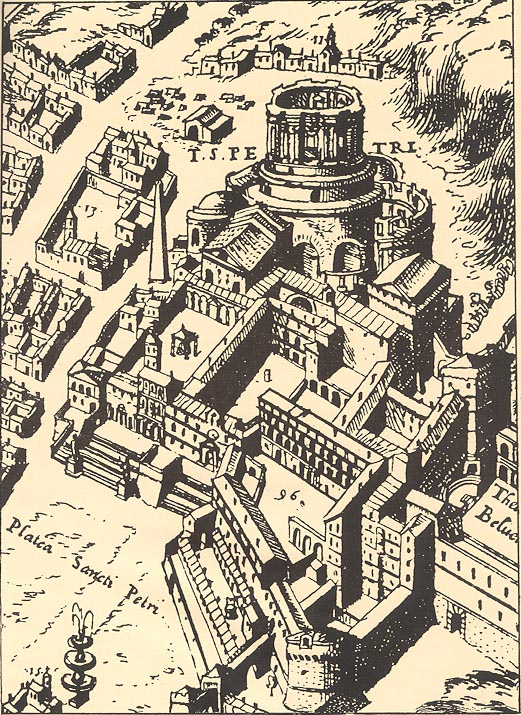| One
of the most revered names in liturgical music and the
foremost composer of the Roman Catholic Church, Palestrina
was born of poor parents and little is known of his early
life. He is said to have earned his living first as a
church-singer. He probably studied in Goudimel's school.
Later he was an organist in Palestrina, the town of his
birth, then magister puerorum (master of the boys singers)
in the Cappella Giula with the title Maestro della
Capella della Basilica Vaticana.
Palestrina dedicated a book
of masses to Pope Julius III who in January of 1554
admitted him to the Pontifical Chapel as a singer. The
Pope admitted him against the rules as Palestrina had a
wife and not a decent voice. On July 30, 1555, Paul IV
dismissed him with a pension of six scudi per month. This
blow affected Palestrian very deeply as he had four
children to support. In fact he suffered so deeply that he
was afflicted with a nervous prostration.
On October 1, the Pope
appointed him the conductor at the Lateran church in Rome.
in 1560, he produced his famous and extremely beautiful
Improperia for Holy Week with such success that the Pope
secured the work for the Sistine Chapel where it has been
performed every Good Friday since. In 1561, Palestrina
took a higher paying position as conductor at Santa Maria
Maggiore.
The Pope was determined to
rid church music of its astonishing secular qualities:
first, the use of street-ballads, even when indecent, as canti
fermi (the cantus fermus is the melody on which masses
and motets can be based). Many of the choir members would
actually sing the words of the secular song instead of the
latin words of the liturgy. Second, the Tumultuous counterpoint with which the sacred texts and the secular
tunes were overrun.
The Council of Trent and a
committee of eight cardinals, considering the matter
seriously, decided not to revolutionize church music
entirely, and in 1564 commissioned Palestrina, by this
time famous, to write a mass that would reform, without
uprooting, ecclesiastical polyphony. He wrote three noble
masses and the third, the Missa papae Marcelli won
the most profound praise. Palestrina was called "the
savior of music" and was appointed composer to the
Pontifical Chapel.
In 1571, he became,
remaining until his death, the maestro of St. Peter's. He
also composed for the Congregazione del Oratorio, taught
in Nanini's school, and was from 1581 maestro concertatore
to Prince Buoncoompagni.
Pope Sixtus V wished to
appoint Palestrina maestro of the Sistine Chapel, but the
singers refused to serve under a layman. He was, however,
commissioned to revise the Roman Gradual and Antiphonal by
Pope Gregory XIII. He published the Directorium chori
in 1582, the offices of Holy Week in 1587, and the Praefationes
in 1588, but on the death of his pupil and assistant,
Giudetti, he was compelled to leave the work unfinished.
A complete edition of his
works was published by Breitkopf and Hartel, the great
German publisher, in the 19th Century.
MP3
Examples
->
Second Lamentation, 1st Nocturne, Good Friday
-> O Magnum Mysterium
Web
-> Palestrina
Audio Presentation
Books
Palestrina
by Henry Coates
J.M Dent and Sons Ltd. 1938
Palestrina
par Michel
Brenet (In French)
Librairie Felix Alcan 1919
Palestrina
(In Italian)
Alberto Cametti
Bottega di Poesia, Milan 1925
Reprint by AMS Press New York
The
New Grove High Renaissance Masters
W.W. Norton & Company, 1980
ISBN 0393300935 (paperback)
ISBN 0393016897 (hardback)
This
will serve as a good introduction to Palestrina's life and
music, as well as the other great renaissance composers
(Byrd, Victoria, Josquin des Pres and Lassus.

Rome In Palestrina's DayThis illustration is taken from an old map of 1570 showing
St. Peter's in the course of reconstruction. The house
where Palestrina lived for nearly a quarter of a century
and died was probably situated in the street at the top
left-hand corner of the picture.
|

